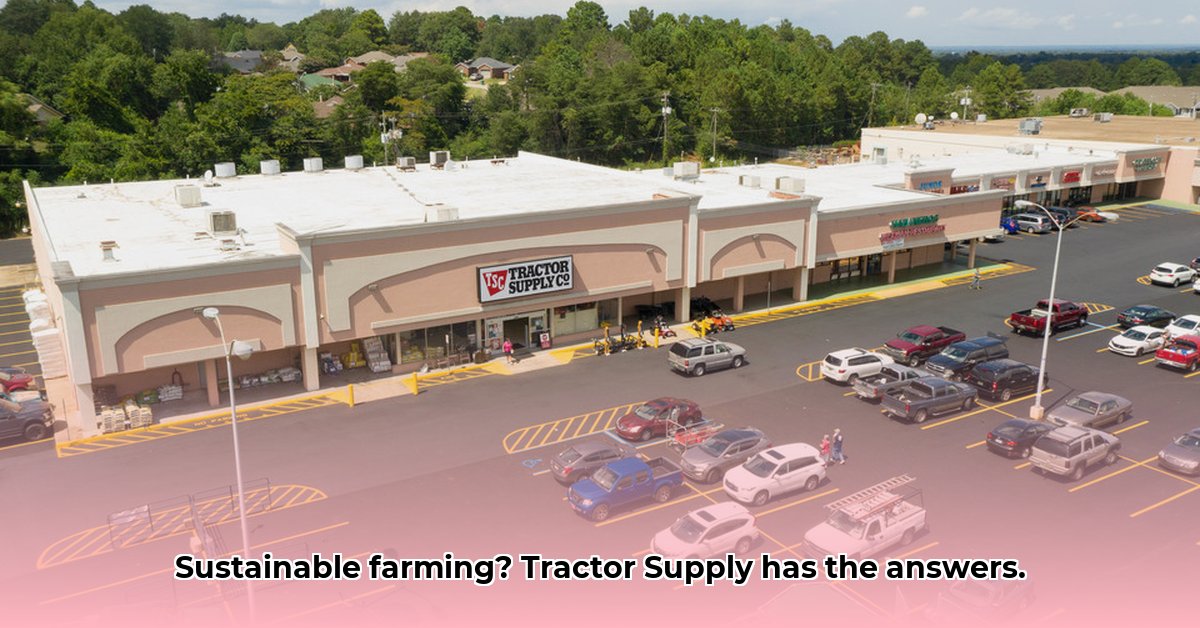
Tractor Supply Company (TSC) in Millbrook, Alabama, is a vital resource for local farmers and gardeners, offering a wide range of products essential for agricultural success. But beyond its role as a convenient supplier, how does TSC contribute to sustainable farming practices in the region? This article explores TSC's impact, identifies areas for improvement, and offers actionable strategies for stakeholders to foster a greener future for Millbrook's agricultural community. For similar stores, check out this Alabama TSC location.
TSC's Indirect Contribution to Sustainable Agriculture
TSC's influence on sustainable agriculture is largely indirect, stemming from its provision of readily accessible supplies. The availability of fencing and water troughs, for example, directly supports improved livestock management, reducing waste and enhancing animal welfare. Similarly, the wide selection of gardening tools and supplies empowers local food production, decreasing reliance on long-distance food transport, and its associated environmental costs. This readily available infrastructure is a significant but often overlooked factor in supporting sustainability. How can we quantify this impact more precisely? Further research into the direct correlation between TSC's accessibility and reduced environmental impact from local food production is warranted.
More Than a Store: A Community Hub
The Millbrook TSC acts as a central hub for a geographically dispersed farming community. Its accessibility is particularly crucial for farmers in more remote areas, ensuring continued access to vital supplies. This accessibility is paramount for maintaining the region's food system's viability and sustainability. Consider the potential disruption if this crucial resource were unavailable—the ripple effect on the community would be significant. What innovative solutions could further enhance TSC's role as a community resource for sustainable agriculture?
Expanding the Scope of Sustainability at TSC
While TSC indirectly supports sustainable practices, opportunities exist to strengthen its commitment. A key area for improvement is promoting and increasing the availability of sustainably sourced products. This includes organic fertilizers, seeds from local producers, and other eco-friendly alternatives. Further, strategic partnerships with local organizations focused on sustainable farming through workshops, educational programs, and collaborative initiatives could significantly increase TSC's positive impact. Would a dedicated "Sustainable Farming" section within TSC stores and online increase awareness and sales of these products?
A Collaborative Path to a Greener Future
Maximizing the positive impact of TSC on the local farming community demands a collaborative approach. The following table outlines actionable steps for various stakeholders:
| Stakeholder | Short-Term Actions | Long-Term Vision |
|---|---|---|
| TSC Management | Increase eco-friendly product offerings; staff training on sustainable farming methods. | Develop a comprehensive sustainability plan with measurable goals and transparent reporting; establish partnerships promoting sustainable farming practices. |
| Farmers/Gardeners | Adopt water conservation, soil health, and integrated pest management; utilize TSC expertise. | Explore diverse farming methods; investigate community-supported agriculture (CSA) models. |
| Local Communities | Support local farmers' markets and community gardens; advocate for sustainable agriculture policies. | Strengthen local food systems; foster education and awareness around sustainable practices. |
| Government Agencies | Incentivize purchasing eco-friendly products; collaborate with TSC to promote sustainable practices. | Invest in research and policies encouraging environmentally sound agricultural practices. |
This collaborative effort is essential for creating a sustainable future for Millbrook's agriculture. TSC's existing influence is substantial, and by leveraging cooperative strategies, we can dramatically enhance its positive impact.
Sourcing Sustainable Supplies: A Practical Guide
While TSC offers many products supporting sustainable farming, identifying them may require proactive engagement. Here's a step-by-step guide to sourcing sustainable supplies:
Online Research: Utilize TSC's website, searching keywords like "organic," "sustainable," and "eco-friendly."
In-Store Exploration: Engage store employees; ask questions about environmentally conscious products.
Label Scrutiny: Verify product certifications (e.g., USDA Organic) to confirm sustainable practices.
Community Engagement: Discuss sustainable options and experiences with fellow farmers.
Advocate for Transparency: Encourage TSC to provide more detailed information about their sustainability initiatives.
This collective action—from individual farmers to TSC management—is crucial for advancing sustainable agriculture in Millbrook. The journey toward environmentally responsible practices requires ongoing commitment and collaborative effort. The impact of these actions will shape the future of farming in the community.